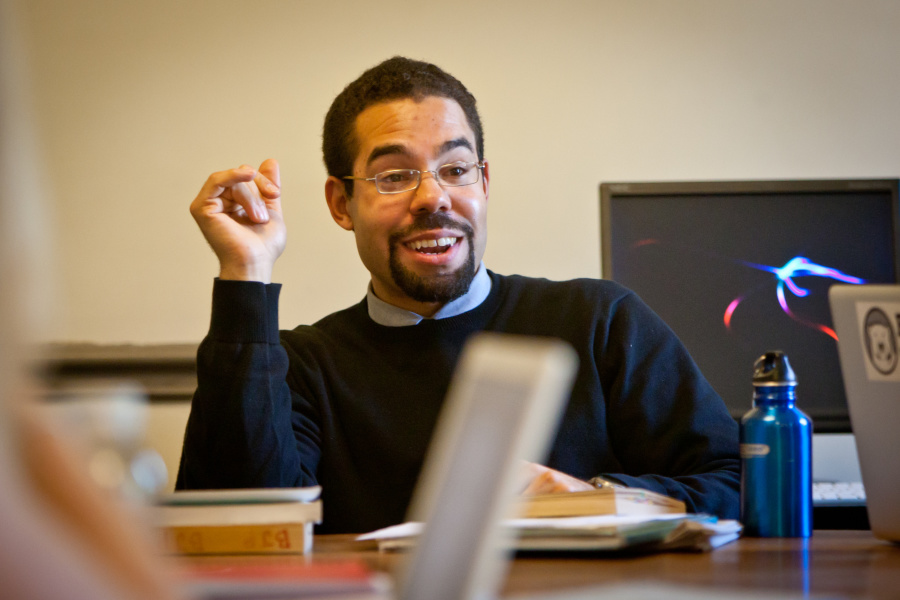Dr. Brian Purnell On The History of Racial Injustice in America, and the Fierce Urgency of Now
“For the past 20 years, I have studied the history of racial discrimination in the United States,” Dr. Brian Purnell began in virtual Hall on February 18. “I focused on this because I wanted to understand my country’s contradictions.”
Dr. Purnell shared his personal journey with Civil Rights Movement history, which includes his work as a historian as well as his own personal experiences of growing up in Brooklyn, New York, in the 1980s and ‘90s. His talk offered a foundational explanation of where our country has been in regard to racism, how far we have come, and how far we still have to go.
“The most famous lines from our Declaration of Independence read, ‘We hold these truths to be self-evident, that all men are created equal, that they are endowed by their creator with certain unalienable rights, that among these are life, liberty, and the pursuit of happiness.’ While Thomas Jefferson wrote those lines in Philadelphia in 1776, over 400,000 people lived as slaves in British North America. The overwhelming majority were in the South, where human labor cultivated tobacco and rice, but there were also tens of thousands of enslaved people who lived in the North—15,000 in Massachusetts and 19,000 in my home state of New York. Americans like to think that racial slavery occurred only in the South, but it was part of the North’s deep, dirty past, too.”
Dr. Purnell discussed how the economy and individuals of the Northern states benefited from and relied on the practice of slavery as much as the South: “Beginning with Massachusetts, northern states had abolished human slavery, but major northern industries—banking, finance, insurance and shipping, as well as manufacturing trades, like shipbuilding, barrel making, rope and sail fabrication—all profited from and relied upon the South’s racial slavery and the cotton it supplied the world. Boston, New York, and Philadelphia needed profits from slavery as much as Charleston, Atlanta, and Birmingham. Racial slavery was never a regional sickness, it was always a national cancer.”
Dr. Purnell walked students and faculty through the work of abolitionists William Lloyd Garrison and John Brown, and through his own transformative experience of reading Narrative of the Life of Frederick Douglass for the first time in ninth grade. He talked about how his third grade teacher, Mrs. Eppolito, who—in wanting to teach her young students about the dangers of racist violence, and the inexplicable nature of rage and prejudice—showed her class the very beginning of the documentary, Eyes on the Prize, which told the story of 14-year-old Emmett Till, including showing images of his dead body.
“‘This is what happens when bigots have their way,’ Mrs. Eppolito told us, and I will never forget that,” Dr. Purnell said.
“When Dr. King spoke about the Fierce Urgency of Now, he highlighted the need for people to act upon the injustices in their current world—not a future one—with compassion and commitment… I look forward to hearing how you find a way to do the same, because like Frederick Douglass said, if there is no struggle, there is no progress.”
Brian Purnell is the Geoffrey Canada Professor of Africana Studies and History at Bowdoin College. His research, teaching, and writing has focused on race relations—as well as related laws and urban development—throughout the boroughs of New York City, though he has also taught and written extensively about the place of racism in both the North and the South throughout America’s history. Dr. Purnell’s first book, Fighting Jim Crow in the County of Kings, tells the story of interracial activists fighting against racial discrimination in Brooklyn during the 1960s. At Bowdoin, he teaches courses on the civil rights movement; racism and criminal law; affirmative action; the history of racial and ethnic conflict in the U.S.; and the history of American cities from the colonial period to the present.
Watch the entirety of Dr. Purnell’s Hall talk, as well as a powerful Q&A session.

